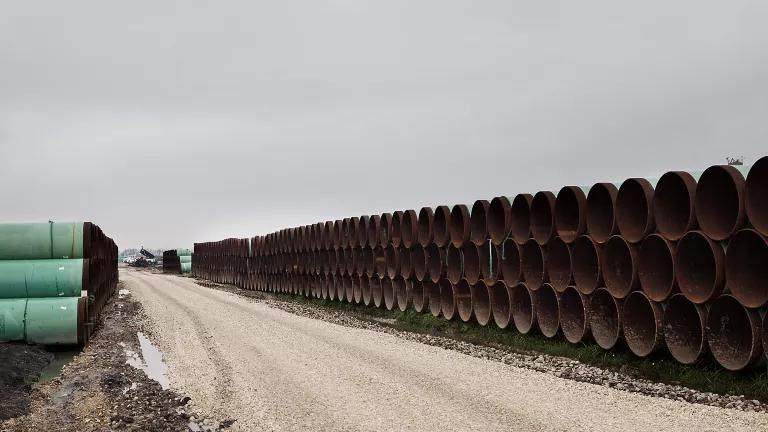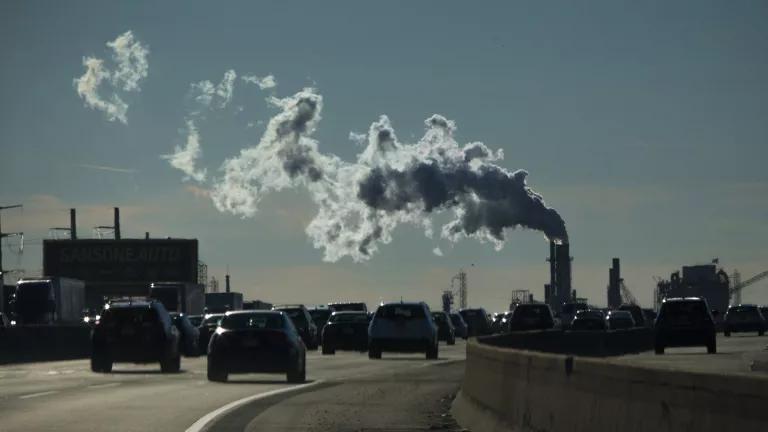Congress: Abandon Fossil Fuels, Not Fossil Fuel Workers
Right now, when so much is uncertain, one thing is clear: fossil fuel companies that pollute communities and the environment are not part of the healthy and equitable economy we are collectively moving toward. For that reason, the federal economic stimulus should not further bail out the already heavily subsidized fossil fuel industry. But while fossil fuel executives and shareholders shouldn’t benefit from additional federal assistance, workers and communities economically dependent on the fossil fuel industry should get both immediate relief and support to transition into new industries. NRDC affirmed its commitment to rescue workers and communities, not corporate executives, by signing onto the Five Principles of Just COVID-19 Relief and Stimulus.
The story of fossil fuels in the U.S. is one of booms and busts. Over centuries, the coal, oil, and gas sectors have created high-paying jobs in communities whose economies and cultures have become closely tied to fossil fuel extraction. In return, workers have endured conditions that are life-threatening on the job (e.g., coal mine collapse and oil and gas well explosion) and years later (e.g., black lung disease). As fossil fuel companies have flourished and crashed over time, communities have likewise endured fluctuations in local tax revenue (of what taxes companies actually pay) and uncertainty about benefits tied to jobs. When companies shutter operations, they often abandon their mess—but not before handing out bonuses to their executives. This ongoing cycle of exploitation has contributed to population decline and lack of investment by other sectors. It has never been and will never be sustainable.
Forthcoming federal economic stimulus packages should invest in the healthy and equitable economy we are collectively moving toward, which does not include the fossil fuel industry.
Legislators should use the federal stimulus as an opportunity to acknowledge and correct the inequities that have led to COVID-19’s disproportionate impact on low-income communities and communities of color. This includes investing in more and healthier affordable housing, access to green space, a cleaner and more equitable energy system, and family-sustaining jobs in the future economy. Under no circumstance should future stimulus funding lock us into decades of high-carbon infrastructure by propping up fossil fuel company executives and shareholders.
While this crisis is an opportunity to accelerate our movement past fossil fuels and toward a low carbon future, we must ensure fossil fuel workers and communities have the support they need to be part of that future.
To do so, any future stimulus should include direct support for workers and communities impacted by the cessation of extraction and use of fossil fuels to transition away from the extractive economy.
For communities, that means tax revenue replacement, funding and technical assistance for transition planning, grants and loans for new and existing small businesses, workforce development support, and funding to manage legacy harms of fossil fuels, including black lung disease, abandoned mine land reclamation, and orphaned oil and gas well remediation.
For workers who are not ready to retire, transition assistance includes funding for wage replacement, housing assistance, health insurance coverage, pension support, and access to career services that will connect them with retraining programs that have guaranteed job placement upon completion in positions with comparable compensation. For workers who are ready to retire, it means early retirement support.
The top 5 ways to direct federal stimulus funds to accelerate a fair energy transition for fossil fuel workers and communities are to:
- Extend the black lung excise tax on coal companies for 10 years and improve the functioning of the black lung benefits program, as required by black lung bills introduced in both chambers.
- Expedite the use of existing funds in the Abandoned Mine Land Reclamation Fund to stimulate economic development on reclaimed mine lands, as required by the RECLAIM Act, and reauthorize that Fund, as required by proposed Amendments to the Surface Mining Control and Reclamation Act.
- Increase federal funding for energy transition efforts undertaken by the Appalachian Regional Commission, Great Lakes Commission, Delta Regional Authority, and other agencies that focus on economic and workforce development in particular regions of the country. These entities are best equipped to effectively channel funds to organizations and projects foundational to economic diversification, including those related to broadband expansion, expansion of existing businesses, and attracting new businesses.
- Allocate at least $200 million to the Community Development Financial Institution (CDFI) fund specifically for CDFIs supporting communities preparing for or responding to the closure of a major energy asset, like a mine or power plant. CDFIs are an important part of the local ecosystem that supports economic stabilization and diversification by investing in small businesses and affordable housing.
- Allocate funding specifically for energy transition support through the National Dislocated Worker Grant Program. Grants issued through the program help expand local capacity to support dislocated workers following an event causing significant job losses.
The forthcoming federal stimulus is a chance to stand with people and communities tied to the fossil fuel industry while reaffirming our commitment to move toward a future without fossil fuels. Congress should not miss this opportunity to make real investments in an equitable transition to a low-carbon future.



